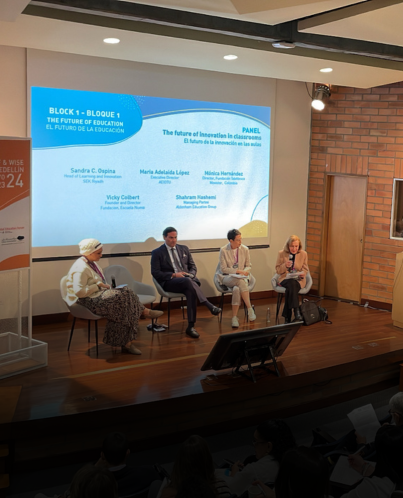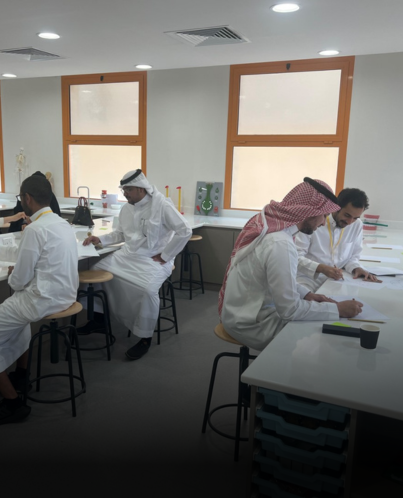AI’s Impact on Education
Technology plays an integral role in shaping the education sector, and is rapidly evolving. Despite being a relatively new innovation, artificial intelligence (AI) is already beginning to transform how today’s students are learning – and will be crucial in preparing them for their lives after graduating. Last month, the Qatar Foundation asked Aldenham Education Group’s Managing Partner, Shahram Hashemi, to speak at the prestigious GEF & WISE @ Medellin Conference and share his years of expertise on these topics – and more. Despite the potential risks of AI, it will have a revolutionary impact on students and teachers alike – and it’s important that governments and educational institutions consider how to regulate this technology while it’s in its infancy, as Shahram Hashemi shared to an audience of rapt education thought leaders.
The benefits of AI in education
While some schools may hesitate to adopt AI tools like ChatGPT – some are going as far as banning it – AI isn’t a threat to education. Rather a valuable tool, and you can learn more in our recent blog on the topic. For example, AI in education can analyse vast amounts of data and turn this into meaningful insights. Not only can this be used by schools and educators to identify trends and areas for improvement (all backed by evidence), but it can be used by teachers in classrooms. Teachers can use these insights to personalise their students’ educational experiences, creating curriculums that are tailored towards each child’s needs, interests, and even learning styles.
As Shahram Hashemi explained while at GEF & WISE, “With this technology, we can make sure that each child gets the needs that they require.” Using AI-powered algorithms, teachers can identify knowledge gaps and give each student specific feedback designed to improve their engagement and achievement. AI tools can even automate the marking of tests and assignments, freeing up teachers to focus on more important tasks. Students, meanwhile, could benefit from AI-powered virtual tutors that offer them real-time guidance and support and can even adapt to each student’s pace, furthering their education outside of the classroom.
The challenges of AI
Although the benefits posed by AI in education are immense, there are some potential risks that must be considered. Since AI relies on vast amounts of data, there are concerns about the privacy and security of people’s data. When it comes to education, it’s important that schools, universities, and other institutions ensure there are robust data protection frameworks in place, in order to safeguard their students’ sensitive information.
While integrating AI into education, we should also take care to consider equality, and ensure that underprivileged schools and communities around the world can access the same AI tools and resources as everyone else. This is crucial to avoid worsening any pre-existing educational inequalities, and was one of the topics discussed by Shahram Hashemi in Medellin earlier this year. Organisations need to be carefully monitoring the use of AI, and ensuring that AI tools remain fair and balanced within education – especially when it comes to student assessment or, later in life, university admissions.
Should AI be regulated?
In order to harness the full potential of AI in education – while still safeguarding students’ best interests, governments and education institutions alike need to adopt more forward-thinking regulations. Some considerations to bear in mind include: establishing ethical guidelines, so that schools can address issues like student privacy, and transparency of AI algorithms; and regularly monitoring AI systems to identify and address potential biases. Organisations should also collaborate to share standards and insights – in the past, AEG has worked closely with the Saudi government, and we hope to continue to share our expertise on this topic.
At AEG’s schools – including Aldenham Prep Riyadh and our schools in the UK – we’ve always embraced technology and innovation wherever possible. As Shahram Hashemi pointed out on stage at GEF & WISE, “We always look at ourselves as trying to innovate in technology, and innovate in the classroom.” Our commitment to providing a cutting-edge learning environment for all of our students across the globe is evident through our use of interactive screens, 3D printers, and other state-of-the-art tools. Moving forward, we are excited about integrating AI technology in our schools to further enhance students’ learning experiences. With the help of AI in education, we can personalise teaching, give teachers valuable insights, and equip students with essential skills for the future.
As AI continues to advance at a remarkable pace, its impact on education is undeniable, but we understand the importance of striking a balance between technology and human interaction – ensuring that AI enhances, rather than replaces, the role of educators. At AEG, we are committed to staying at the forefront of educational innovation and harnessing the power of AI. By using AI in education responsibly, we can ensure that our students are well-equipped to navigate the challenges and opportunities presented by the jobs of tomorrow. Find out more about the facilities – including cutting-edge technology – on offer at Aldenham Prep Riyadh.


